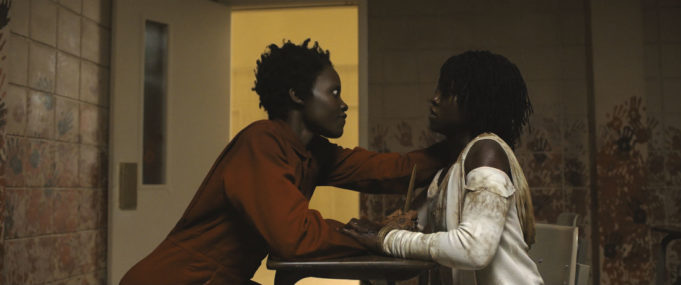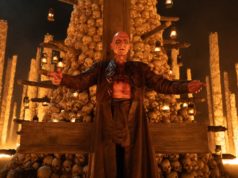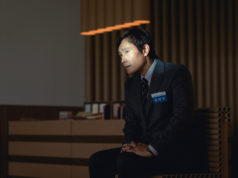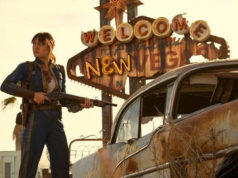Like Stephen King, Jordan Peele is a master at setting up an aggressively normal world and then introducing details that are further and further off until we’re in the middle of a full-blown nightmare. I would recommend that Peele adapt one of King’s novels, but I have trouble seeing how King’s lily-white fictional universe would come out in the hands of this determinedly black filmmaker. (If someone could find a way to reconcile those, it would be sensational.) It’s hardly fair that Peele is the one dude tasked with making all the horror movies from an African-American point of view, but since that is the case at the moment, it’s well that Peele is that one guy. His second horror film Us isn’t as good as his 2017 debut Get Out, but it shows what a gifted director he is.
The film begins with Adelaide Wilson (Lupita Nyong’o) going with her husband Gabe (Winston Duke) and their two children Zora and Jason (Shahadi Wright Joseph and Evan Alex) to a beach house in Santa Cruz. She is a terrified and overprotective mother, which is understandable given the flashback sequences to a trauma that she experienced as a little girl (Madison Curry) in 1986. When the power goes out at their house and Jason matter-of-factly informs his parents, “There’s a family in our driveway,” there are indeed four people there. They look exactly like the Wilsons, they’re all wearing red robes and leather gloves on one hand, and they’re hellbent on murdering the Wilsons with the pairs of scissors that they’re carrying.
Where Get Out’s commentary on American race relations crawled inside your brain and knocked around for weeks after you saw the film, Us doesn’t have that type of power because its metaphors don’t track so well. The giant evil scheme behind everything feels recognizably like it came from the people who made the Coagula and the Sunken Place, yet the big revelation near the end only raises more questions where Get Out’s neatly tied things up. The film’s attempts at social satire come off as inept as the Purge movies’.
Fortunately, Peele is better at scaring you than the directors of the Purge series or just about any other horror filmmakers. He can conjure up fear even in broad daylight on a crowded beach, as Jason finds himself drawn towards a faceless white guy standing on the sand like a scarecrow, with blood unaccountably dripping from his fingertips. The movie makes frequent reference to the Biblical verse Jeremiah 11:11, which is quite appropriate to the setting. The horror and the humor come from details specific to the setting, like the way Gabe’s accent becomes more “ghetto” when he’s trying to scare off the doubles. (It’s funny because Gabe’s ghetto-speak is so unconvincing. Duke, who made such an impression as M’Baku in Black Panther, does terrific work against type as a dorky dad.)
The fight sequences here come off quite well, especially when you consider that most of them have the same actor playing both the combatants. During one deadly struggle on a boat, the camera pulls back to reveal that the boat’s name is the B’Yacht’ch. Peele indulges in a Kubrickian shot of a long, brightly lit hallway with bunny rabbits hopping around, but he also films a great many shots of mirrors and windows (and the identical twins belonging to the Wilson’s white friends down the road) to go with the script’s theme of doubles.
Better even than the director’s rigor is Nyong’o’s performance. She’s excellent as the fearful mother, but she is utterly terrifying as the evil version of Adelaide, who moves around with the precision of the dancer that Adelaide once wanted to be. The doppelgänger’s hoarsely delivery of her first line — “Once upon a time, there was a girl, and the girl had a shadow,” — made me want someone to hold me. This actress won an Oscar for her very first film performance in 12 Years a Slave, and then Hollywood seemed stumped about what to do with her. Now, though, it seems bleedingly obvious that her limits have not yet been tested as the voice of conscience in Black Panther or the hellspawn here or the mother who takes a fireplace poker and marches resolutely into the mouth of hell to confront the demons of her childhood. She and the black directors on these films have put white Hollywood to shame. How could so many filmmakers overlook the intensity, the physicality, the versatility, and the beauty of this actress? I mean, even the fashion magazines caught on to that last bit. Her powerful screen presence is a power all their own, one that could have improved so many movies of recent years. That needs to be made use of, as Us demonstrates.
Starring Lupita Nyong’o and Winston Duke. Written and directed by Jordan Peele Rated R.












